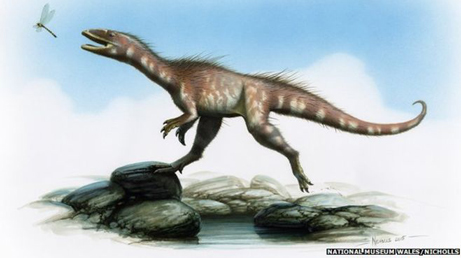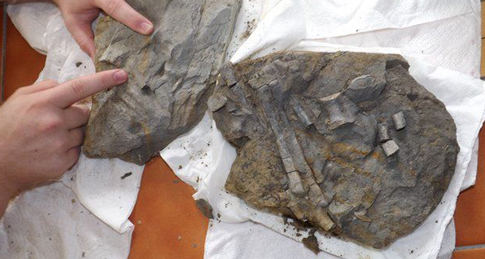“Lucky Find” Puts Rare Welsh Theropod Discovery on a Firm Footing
Fossilised Dinosaur Foot Bones Found on Welsh Beach
Serendipity and palaeontology are often strange bedfellows, but luck does play a part especially when you consider the difficulties in finding very rare and exceptional items such as Early Jurassic dinosaur bones. Take the example of palaeontology student Sam Davis who has been lucky enough to have been in the right spot at the right time to find the fossilised foot bones of the first meat-eating dinosaur known from Wales. These bones belong to an, as yet, not scientifically described species of theropod dinosaur found by brothers Nick and Rob Hanigan in 2014. The bones come from the Lower Jurassic strata exposed at Lavernock beach (Vale of Glamorgan).
Lower Jurassic Dinosaur Fossils
An Illustration of the Newly Discovered Welsh Dinosaur
Picture credit: National Museum of Wales/Bob Nicholls
To read more about the 2014 dinosaur discovery: Welsh Dinosaurs – New Early Jurassic Theropod Discovered.
Fossilised Dinosaur Foot Bones
A significant proportion of the skeleton, including skull material, was found by the brothers after spring storms revealed the specimen last year. However, student Sam Davies decided to visit the beach to explore the fossil location after his tutor explained to him about the geology of the area and the nature of the fossils likely to be found eroding out of the steep cliffs. Sam duly arrived at Lavernock Point just a few hours after a rock fall had exposed the fossil. Had he decided to visit the site just a few days later, the fossil specimen would very likely have been washed away by the tide and lost to science forever.
The Foot Bones of the Welsh Theropod Dinosaur
Picture credit: National Museum of Wales
A Lucky Discovery
Third year student Sam, had visited the beach hoping for inspiration for his third year project as part of his studies at the University of Portsmouth, it looks like he has hit the jackpot with his lucky discovery. We suspect that Welsh theropods are going to feature in his individual research project this semester.
Commenting on his lucky fossil find, Sam stated:
“It was pure luck that I found it. The fossil was just sitting on top of a slab of rock. It was obvious the fossil was fingers or toes, because there were three in a row, but the first thing that came to mind was that it was some sort of plesiosaur [marine reptile fossils are occasionally found in this area].”
Donated to the National Museum of Wales
The fossil has been donated to the National Museum of Wales, joining the rest of the theropod material. Sam’s tutor is renowned vertebrate palaeontologist Dr David Martill, he has been tasked with the job of studying the Welsh fossils and producing a scientific paper on the 200-million-year-old dinosaur. Everything Dinosaur expects the paper, along with a name for this three-metre-long, meat-eater to be published next year.
Sam admits to “jumping up and down like a little boy” when he realised the significance of his discovery.
Dr Caroline Butler, (Head of Palaeontology, National Museum of Wales) exclaimed:
“The dinosaur found by Nick and Rob Hanigan is the first skeleton of a theropod found in Wales. Sam’s find adds to its significance because we can learn more about the animal and how it is related to the dinosaurs that eventually evolved into birds.”
The fossil was actually found some weeks ago, but the announcement of this latest discovery coincides nicely with a television documentary being aired on ITV1 on Monday 31st August with part two the following evening. The documentary entitled “Dinosaur Britain” explores the rich dinosaur heritage of the British Isles and the Welsh theropod is featured in the second programme of this two-part documentary.
For information on “Dinosaur Britain”: Dinosaur Britain Scheduled for Bank Holiday Monday.
Everything Dinosaur Comments
A spokesperson from Everything Dinosaur explained:
“The first dinosaurs to be scientifically studied, were described from fossils found in the British Isles, but even today something like one in twenty of all the known dinosaurs is represented by fossil material discovered in this part of the world. The finding of the additional Welsh theropod bones was extremely serendipitous and we wish Sam every success with his studies.”
Here’s one palaeontology student who has helped to put Welsh theropods on a firmer footing.
Everything Dinosaur stocks a wide range of models of British theropod dinosaurs: Dinosaur and Prehistoric Animal Replicas.



